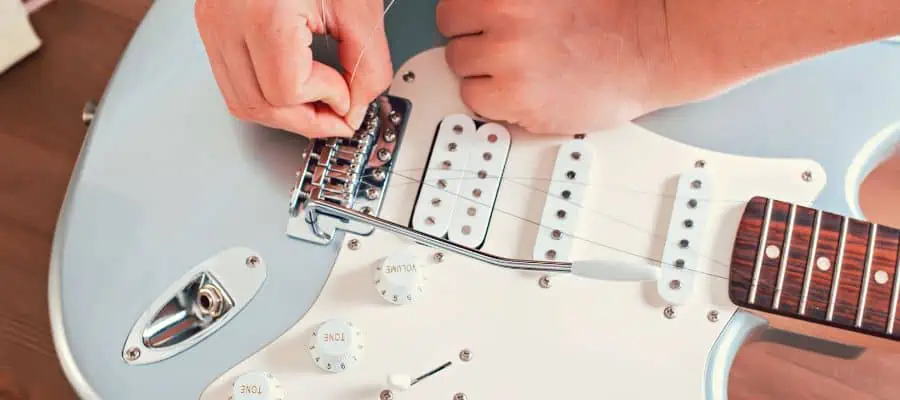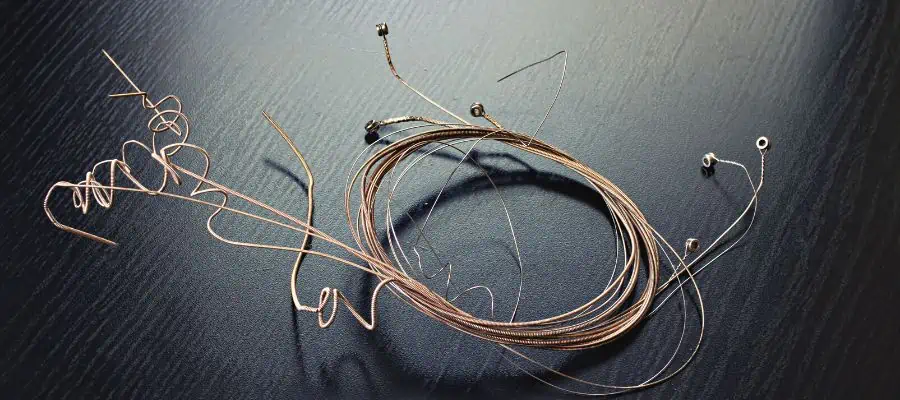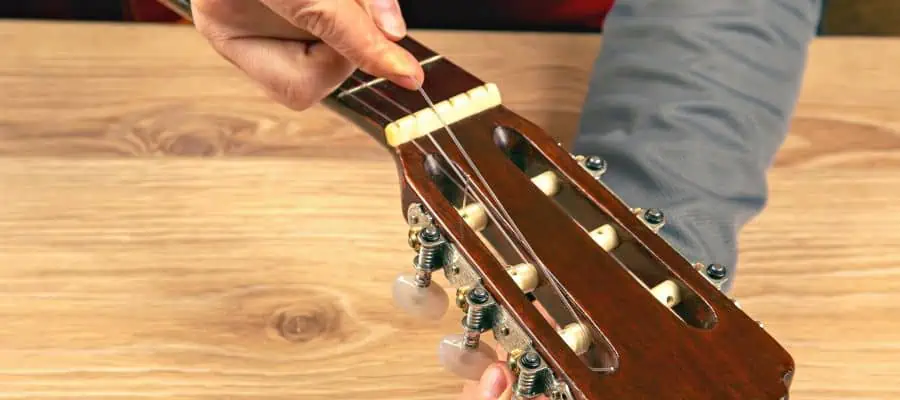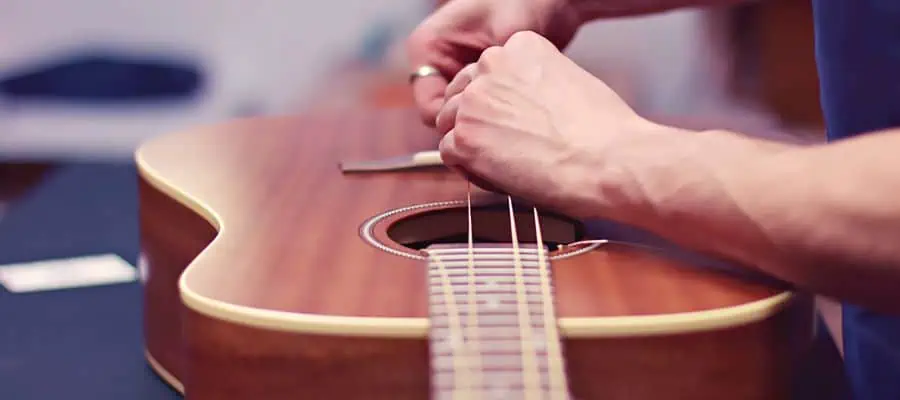Both beginner and seasoned guitarists put a lot of time and effort into practicing, choosing new gear, learning, and composing new tunes. But, the maintenance should not be forgotten. Restringing is an often overlooked and delayed process by guitar players, which results in a decrease in the quality of sound and playability of the instrument.
Like any other part of the guitar, guitar strings undergo tear and wear over time. If you don’t restring your guitar in time, your instrument will have a dull, off-key sound, as well as worse playability and a higher risk of snapping and breaking strings during a practice session or on the stage.
Let’s dive deeper into the realm of old strings to understand why it is crucial to restring your guitar frequently.
Why Restringing Your Guitar Matters: The Neglected Strings

Restringing is a highly important part of guitar maintenance as it is crucial for the guitar to keep a high-quality sound, good playability, and healthy strings. The strings get dirty and rusty over time, having a detrimental effect on the sound and playability.
The average rule of thumb is to restring your guitar strings every 100 hours of use or whenever you see the first signs of wear and deterioration. This way, you can maintain a consistent, vibrant sound, tuning stability while reducing unexpected string breakage,
What Happens To Guitar Strings Over Time: The Science Behind it

Let’s talk about the science of guitar strings to grasp the importance of changing strings better. Acoustic and electric guitar strings are commonly made of steel, nickel, or bronze. All these materials are highly susceptible to degradation as they get affected by humidity, temperature changes, as well as natural acids and oils from your fingers.
Because of these reasons, guitar strings lose their vibrancy and elasticity over time. As they age, they stretch unevenly, leading to tuning instabilities and intonation problems. A guitar with old strings will require constant adjustments to prevent it from sounding off-key.
Rust, Dirt, and Corrosion: The Enemies of Your Guitar Strings
The main reasons for degradation are corrosion and rust. Corrosion happens because of the accumulation of oil, dirt, and sweat from your fingers on the strings, leading to a gritty feel and decreased sound quality. Rust occurs on metal parts of the strings, giving the instrument a diminished tone and rough texture.
If you have sweaty fingers or live in a humid place, rust can occur on the strings even faster. After playing, you can wipe your strings with a cloth and keep your hands clean to enhance your string life. However, at some point, you will have to restring your guitar to prevent it from sounding lifeless and dull.
The Impact on Playability: Difficulty and Frustration
Aged strings create buzzing, intonation problems, and a less enjoyable playing experience. As the strings lose their elasticity and start to stretch unevenly with time, finger placements and chord-shape transitions get harder. Also, playing clear notes and chords gets more difficult.
Especially for beginner players, worn-out strings can hinder progress and be discouraging. Also, for experienced players, aged strings are frustrating as they limit the range of techniques and sounds.
Breakage Risk: Why Old Strings Snap at the Worst Moments
Probably the most problematic effect of old strings is their susceptibility to breaking. Old strings are significantly weaker and more brittle than new strings. So they are more susceptible to snapping under tension. That’s why there is a big risk of old strings snapping during a practice session or, worse, on the stage.
Tuning Instability: Why Old Strings Won’t Stay In Tune
Old strings do not stay in tune for long as they are less elastic and stretch unevenly compared to newer strings. Aged strings suffer from frequent detuning as they lose their capability to maintain tension constantly.
You may be able to tune your guitar with old strings, but after a few days, maybe hours, it will go out of tune again and won’t consistently hold the tune. When you start to experience tuning instability, it means the time for restringing has arrived.
Is Changing Strings a Matter of Preference?

Some guitarists claim that old strings have a mellower, warmer tone, which they prefer to have compared to the bright tone of newer strings. This is a personal choice, but the balance between playability and tone is crucial, and those guitarists go for that sweet spot.
For some styles, mildly aged strings can produce better tones. But old strings not only decrease the playability it also decreases the longevity of your instrument. Old strings can snap and damage your guitar’s frets, bridge, or even the body. So, changing the strings regularly is both an investment for your instrument’s lifespan as well as your playing experience.
When To Change the Guitar Strings?

While there is no general restringing frequency, 100 hours of playing is a commonly accepted timeframe. After 100 hours of playing guitar, the strings started to wear out, which meant the time for the restringing came.
If you are not playing your guitar frequently and 100 hours of playing is a long time for you, changing your guitar strings every 2 to 3 months is also a good rule. But you should note that depending on the humidity, temperature, and playing style, the restringing frequency may change. After some experience playing your guitar, you will start to have the sensation of changing your strings, and that is the right time!
Conclusion
In conclusion, neglecting to change your guitar strings leads to significant problems with your instrument’s tone and playability, as well as its overall life. Being a responsible and conscious guitarist and realizing the necessary maintenance for your guitar is crucial for being a good musician.
The science behind the corrosion, rust, and wear is pretty self-explanatory and hard to deny. There may be some guitarists going with the old strings for tonal preferences, but it must be noted that the advantages of fresh and well-maintained strings easily outweigh the negative parts.
If you found this article useful, you may want to save this pin below to your Guitar board.

Recent Posts
Some guitarists insist on buying an expensive amplifier with their electric guitar. They assume that this is a must for every type of guitarist out there. However, in some situations, this isn’t...
Top 50 Free Realistic Guitar VST Plugins With Sound Examples
As technology has rapidly advanced in the recent decade, computers are stealing more and more roles from physical musical instruments and accessories. Nowadays, you do not need expensive amps,...

